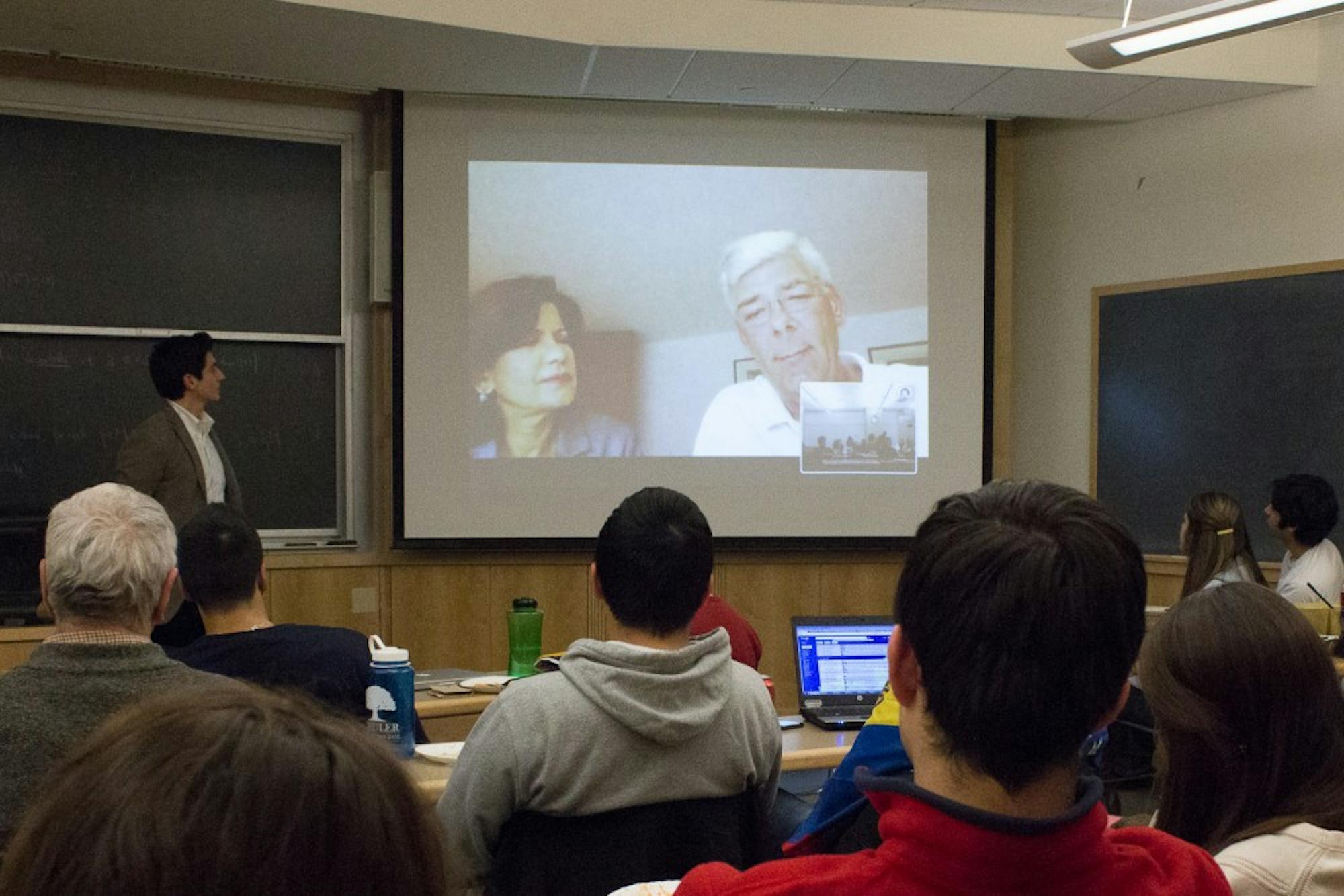On the eve of the first anniversary of former Venezuelan president Hugo Chavez’s death, around 30 Dartmouth students gathered in support of the Venezuelan students thousands of miles away who are leading national protests against the regime of current president Nicolas Maduro. After the Latin American Political Society gave a presentation about the political unrest that has rocked Venezuela since Chavez died last March, students spoke with Caracas residents Jeroen and Marlene Candel, who have participated in the ongoing demonstrations, via Skype.
Protests began on Feb. 12 , when thousands flooded the streets to express opposition to the government. Since the unrest began, the Venezuelan government has censored the press and social media and arrested opposition leaders and college students.
Latin American Political Society member Alejandro Gomez-Barbosa ’14 said he organized Tuesday’s event to support the 18 people who have been killed since the unrest began, the hundreds who have been injured and the thousands that have mobilized to oppose the government.
“Right now the only thing we can do from far away is hope that an assimilation of information compels the government to act,” Gomez-Barbosa said. “Not only that, but that the international spotlight pressures the government to act. The situation is not as black and white as the government is making it seem.”
Jeroen Candel said that although the protests began with college students demonstrating around Caracas, they have become a nationwide social movement.
The Candels, friends of Gomez-Barbosa, said they have felt increasingly unsafe in the three weeks since the protests began.
“We drive in an armored car and we stay at home most of the time these days,” Marlene Candel said. “It’s a very, very difficult situation.”
The couple attended a protest on Feb. 23, hoping that the demonstrations would highlight the nation’s political corruption, Marlene Candel said.
“It was massive,” Jeroen Candel said. “It was three kilometers of a four-lane major avenue in Caracas, absolutely packed with people. It was peaceful. There were a lot of students with very creative ways of telling what is wrong and what should change.”
At the event, Sonja Uribe ’14 and Gilberto Garcia ’14 spoke about the current political unrest in Venezuela, emphasizing the failing economy and dissatisfaction with Maduro.
“This government is an illegitimate government,” Jeroen Candel said. “It’s a terrible government in terms of managing the most important process in the country, the economical process, and it is an abysmal government in terms of managing human rights and listening to the voice of people who are not in agreement.”
Maduro, a former bus driver, officially took office last April after winning the election by a margin of 1.5 percent. He since has empowered the military “Chavistas,” or Chavez supporters, Uribe said, adding that despite shared ideals, Maduro lacks the charisma that won supporters for Chavez.
Garcia said the protests were sparked by outrage over increasing violence and corruption. Many have struggled to find necessities like toilet paper and groceries, Gomez-Barbosa said.
The current protests are the largest since Chavez died of cancer last year.
Before the presentation, students gathered for a picture, showing support for the Venezuelan opposition by wearing white shirts and holding the Venezuelan flag and banners that read, “WE ARE DARTMOUTH AND WE CARE #PRAYFORVENEZUELA” and “#SOSVENEZUELA.”
After speaking with the Candels, several students reflected and shared their thoughts on Venezuelan politics.
Some said that one of their primary concerns is violence in Venezuela, noting that neither Maduro nor Chavez has done anything to reduce crime rates.
Gomez-Barbosa said the Latin American Political Society, founded last year by Nicolas Blanco Galindo ’14 and Julio Santiago Guerrero ’14, has 14 members and organizes approximately three presentations each term.




